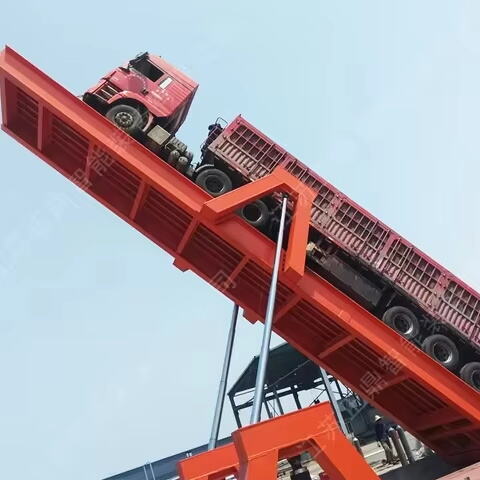Introduction to Hydraulic Truck Unloaders in Material Handling
What is a Hydraulic Truck Unloader?
Hydraulic truck unloaders represent essential equipment for lifting and moving stuff off transport vehicles. They rely on hydraulic power to generate enough strength for those really heavy loads, which explains why so many different sectors depend on them day after day. We see these machines at work across warehouses, construction sites, and agricultural facilities where things like grain, gravel, sand, and all sorts of industrial goods need to be moved quickly. The automation aspect makes a world of difference compared to older manual methods. Workers spend less time struggling with backbreaking tasks while companies save money on labor costs over time. Looking at how widespread their adoption has become tells us something important about where manufacturing and logistics are headed these days.
The Role of Efficiency in Modern Material Handling
Getting materials moved around efficiently means getting more done overall, which saves both time and money on labor costs. Hydraulic truck unloaders are making a real difference in how supply chains work because they speed things up and make unloading much more dependable. Companies that have started using these hydraulic systems report cutting down unloading times quite a bit, sometimes saving as much as 30% on costs. When businesses start incorporating this kind of automation into daily operations, they tend to see better throughput rates and fewer periods where nothing gets done while waiting for trucks to unload. The whole industry is becoming more flexible and able to react quickly to what customers need right now. Looking at how much difference good equipment makes shows just how important it is to invest in proper material handling solutions if companies want to stay competitive today.
Increased Operational Efficiency & Speed
Faster Unloading Compared to Manual Methods
Hydraulic truck unloaders beat manual unloading hands down when it comes to speed. These machines can finish what would take workers hours in just minutes flat. Facilities that have switched to hydraulic systems typically see their unloading times cut down between half and two thirds, which really speaks volumes about how much better they are at getting things done efficiently. What makes them so good? Well, they're automated, so there's less chance of mistakes happening because someone got tired or distracted. Plus, operators don't get as worn out since they aren't doing all the heavy lifting themselves anymore. This means materials get handled consistently without those random issues that come up during long shifts of manual work.
Reducing Supply Chain Bottlenecks
Hydraulic truck unloaders can move goods off trucks really fast, which helps cut down on those annoying supply chain delays everyone complains about. When products get unloaded quickly, they don't sit around waiting for long periods before moving onto packing or storage areas. This speed makes all the difference when it comes to keeping delivery timelines consistent. For companies operating in tight markets where customers expect their orders on time every time, having this kind of efficiency isn't just nice to have it's basically table stakes these days if they want to stay competitive against rivals who might be using similar equipment.
Continuous Material Flow for Higher Throughput
Hydraulic truck unloaders keep operations running nonstop, which means fewer workflow disruptions at facilities dealing with big material volumes daily. These systems fit right into current production setups without causing any hiccups in the material handling process. Industry reports suggest that companies switching to hydraulic unloaders often see their throughput jump around 30% give or take, which translates into real money saved and earned. The constant material movement combined with this increased capacity helps manufacturers stay ahead when customer orders start climbing during busy seasons or unexpected surges in demand.
Enhanced Workplace Safety Features
Minimizing Worker Injuries Through Automation
Hydraulic truck unloaders make workplaces much safer for employees by cutting down on injuries caused by repetitive lifting tasks. When companies automate their unloading processes, workers don't have to bend, twist or lift heavy loads anymore something that leads to back problems and muscle strains in traditional setups. Industry reports suggest that businesses implementing these systems see around a 40 percent drop in accident rates during loading and unloading operations. The numbers tell an important story about how automation isn't just convenient but actually life changing for many warehouse staff who previously faced daily risks from manual handling duties.
Stable Loading/Unloading with Hydraulic Control Systems
Hydraulic control systems keep things steady when loading and unloading happens, which makes the whole operation much safer overall. What these systems do is deliver really precise movement control that cuts down on accident risks caused by wobbling or shaking parts. When materials shift unexpectedly while being moved around, especially those heavy loads, that's where problems start happening. The stability maintained by hydraulics stops this kind of incident before it even gets going, protecting not just workers but also all the expensive machinery involved in the process.
Reduced Exposure to Dust and Hazardous Materials
Hydraulic truck unloaders make workplaces safer by cutting down how much workers come into contact with dust and dangerous stuff. When materials are unloaded through hydraulic systems, there's better control over what gets released into the air during operations. Cleaner air means fewer respiratory issues for staff, which makes sense when dealing with things like cement dust or chemical powders. The whole setup just creates a healthier environment where people aren't constantly breathing in whatever they're supposed to be moving around.
Cost-Effective Material Handling Solutions
Lower Labor Costs Through Automation
Putting hydraulic truck unloaders into operation cuts down on labor expenses because they cut back on how many workers are needed for the job. When these machines handle the unloading instead of people, businesses spend less money on wages and benefits. Industry reports indicate savings around 50 percent for companies switching from manual to automated systems. For warehouse managers dealing with tight budgets, this kind of investment pays off fast. Plus, the whole supply chain runs smoother when trucks get unloaded quicker without waiting for available staff during peak hours.
Reduced Downtime and Maintenance Requirements
Compared to old school manual unloading techniques, hydraulic systems typically need way less maintenance, which definitely cuts down on costs over time. Most manufacturers build these systems to last longer because they know how expensive repairs can get. The components are often made from tougher materials that withstand wear and tear better than their older counterparts. Looking at industry data from maintenance logs, companies switching to automation report around 30% less downtime on average. That means fewer production hiccups and happier customers who don't have to wait as long for their orders.
Long-Term Savings from Equipment Durability
Putting money into hydraulic truck unloaders pays off over time because they're made tough enough to handle whatever comes their way. The construction quality means these units don't break down as easily as regular equipment does during daily operations. Some field tests show that good quality hydraulic systems tend to stick around much longer compared to older unloading techniques. This translates to real savings for businesses since there's less hassle with replacing parts or fixing things when something goes wrong.
Versatility & Adaptability
Handling various materials (bulk goods, aggregates, grains)
Hydraulic truck unloaders can tackle all sorts of materials, which is why they show up so often in various industries. These machines work well with everything from loose bulk items to heavy aggregates and even grains that need careful unloading. The real advantage comes from this ability to switch between different types of cargo without much hassle. For businesses trying to get their material handling operations running smoother, these unloaders represent a smart investment that pays off over time through better efficiency and reduced downtime.
Integration with conveyor and storage systems
Hydraulic truck unloaders work really well when integrating them into current conveyor setups or storage facilities. They just slot right in without causing major disruptions to what's already there. What this means for operations is that materials keep moving smoothly from one point to another, which cuts down on wasted time and resources during handling. The ease of getting these systems connected actually boosts productivity quite a bit. Warehouses and distribution centers see real improvements in how fast things get done once they have proper integration going between trucks and their internal logistics networks.
Conclusion
The long-term value of hydraulic truck unloaders
Looking at the bigger picture, hydraulic truck unloaders deliver solid long term value because they really boost how efficiently operations run day to day. What makes these machines so useful? They cut down on running expenses, create safer working conditions, and generally get more done across the board. When companies streamline their unloading workflows, they see quicker turnaround for shipments while relying less on manual lifting tasks that often lead to injuries. For anyone dealing with materials regularly, these unloaders stand out as essential equipment. The savings add up over time, plus they adapt well to different industry requirements from food processing plants to construction sites where heavy loads need moving safely and quickly.
Future advancements in material handling technology
Material handling tech looks set for some exciting developments in the coming years, particularly when it comes to hydraulic truck unloaders. With so many industries changing fast these days, engineers are working hard to make machines that can keep pace with shifting requirements. What we might see includes better automation built into these systems, stronger parts that last longer under tough conditions, plus monitoring features that let operators know when maintenance is needed before breakdowns happen. The bottom line is that manufacturers want their equipment to work smarter not harder, which means hydraulic truck unloaders will continue playing a key role in keeping warehouses and distribution centers running smoothly while cutting down on downtime and repair costs across the board.
FAQ
What industries commonly use hydraulic truck unloaders?
Hydraulic truck unloaders are commonly used across industries such as agriculture, construction, and manufacturing, where they are critical for unloading bulk materials like grains, aggregates, and various industrial goods.
Can hydraulic truck unloaders handle different types of materials?
Yes, hydraulic truck unloaders are designed to handle a range of materials including bulk goods, aggregates, and grains, making them versatile tools for different industry needs.
How do hydraulic truck unloaders contribute to workplace safety?
They enhance workplace safety by minimizing worker injuries through automation, ensuring stability during loading and unloading cycles, and reducing exposure to dust and hazardous materials.
Are hydraulic truck unloaders cost-effective?
Yes, they are cost-effective as they reduce labor costs, require less maintenance, and offer long-term savings through their durable construction.
What advancements can we expect in hydraulic truck unloaders?
Future advancements may include integrating smarter automation technologies, upgrading components for higher performance, and developing systems for real-time monitoring and predictive maintenance.

